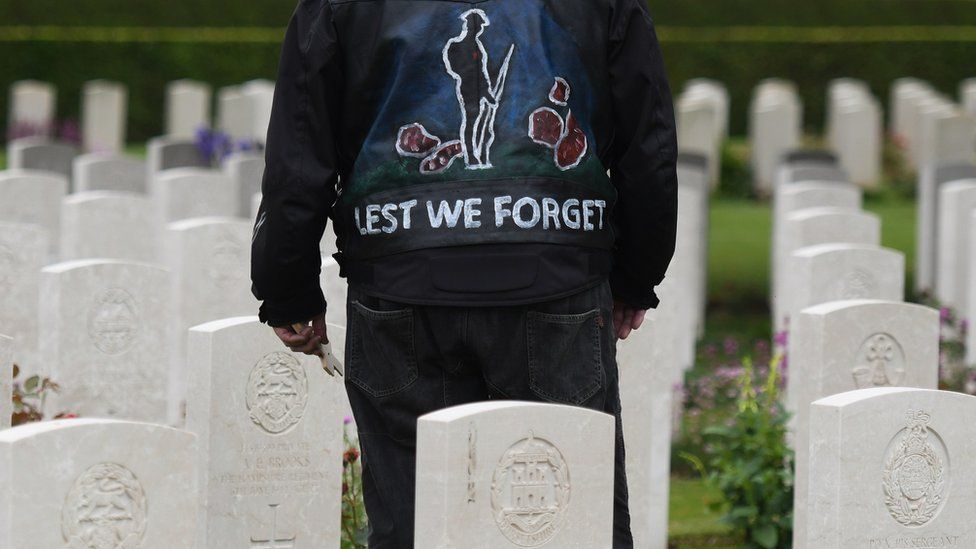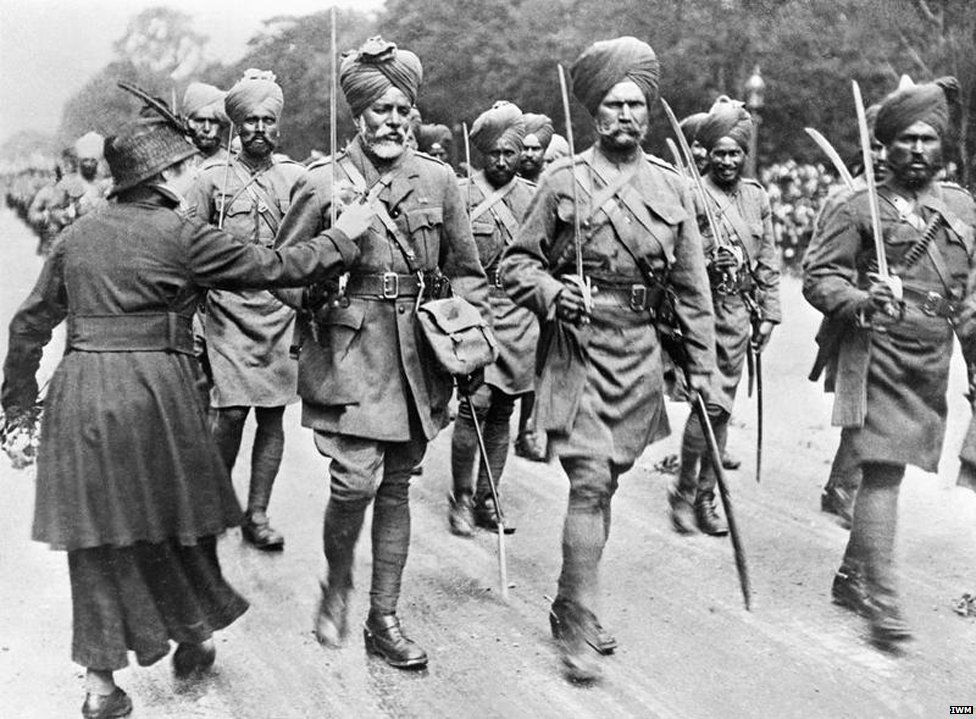Racism blamed for failure to commemorate black and Asian troops

Tens of thousands of predominantly black and Asian service personnel who died fighting for the British Empire were not properly commemorated due to "pervasive racism", a report has said.
Some troops were commemorated collectively or their names were recorded in registers, while their white counterparts had headstones.
The Commonwealth War Graves Commission has apologised over its findings.
Labour MP David Lammy called it a "watershed moment".
An inquiry was set up following a 2019 Channel 4 documentary presented by Mr Lammy, Unremembered.
It found that at least 116,000 mostly African and Middle Eastern casualties from World War One "were not commemorated by name or possibly not commemorated at all".
But that figure could be as high as 350,000, according to the commission's report first seen by the Guardian.
It also cited racist comments such as the governor of a British colony saying in 1923 that: "The average native... would not understand or appreciate a headstone."
Defence Secretary Ben Wallace will address MPs about the findings later.
In an interview with the BBC, shadow justice secretary Mr Lammy said that while making the documentary in Kenya and Tanzania, he discovered mass graves in which Africans had been "dumped with no commemoration whatsoever".
He said it was a travesty that men who served the British Empire were not commemorated properly, but welcomed the report.
"I'm just really, really pleased that the dignity that these men deserved - who were dragged from their villages and commandeered to work for the British Empire - that dignity that they deserve in death can be granted to them," he said.
Mr Lammy added that work must be done to find their names in archives where that is possible, and to establish how local communities would like them to be commemorated.
Historian Prof David Olusoga, whose television company produced Unremembered, said the commission knew about the issues and had to be "dragged into admitting its history".
He told BBC Breakfast that apologies weren't enough and resources would need to be committed if the commission was serious about restorative justice.
"If the Commonwealth War Graves Commission had set up a committee and discovered that 100,000 white British soldiers lay in mass graves -unmarked, uncommemorated - and the documentation proved that that had been deliberate, what would they do?" he said.
"They deserve equal treatment, and they deserve equal treatment now," he added.
Six million soldiers from the British Empire served in World War One.
Between 45,000 and 54,000 Asian and African personnel who died in the conflict were "commemorated unequally", the commission said.


What was the role of British Empire soldiers in WW1?
- World War One was the first truly global war, fought not just in the trenches of France but in the Middle East, Asia and Africa
- Britain's colonies sent millions of men to fight for the empire during the conflict
- India, which at that time included Pakistan and Bangladesh, sent the most soldiers - more than 1.4 million
- Colonies as far away as Canada, Australia, New Zealand, South Africa and Rhodesia (now Zimbabwe) also sent a similar number between them
- Britain had soldiers from five different continents: Europe, North America, Australasia, Asia and Africa

The report concluded that the failure to properly commemorate the individuals was influenced by a scarcity of information, errors inherited from other organisations and the opinions of colonial administrators.
"Underpinning all these decisions, however, were the entrenched prejudices, preconceptions and pervasive racism of contemporary imperial attitudes," it added.
Founded in 1917 as the Imperial War Graves Commission, the organisation is tasked with commemorating those who died in the war.
The report picked out an example from 1923 when the governor of the Gold Coast colony, now Ghana, argued for collective memorials rather than individual ones.
At a meeting in London, it was said that the governor, F G Guggisberg, said: "The average native of the Gold Coast would not understand or appreciate a headstone."
In response, commission employee Arthur Browne said: "In perhaps two or three hundred years' time, when the native population had reached a higher stage of civilisation, they might then be glad to see that headstones had been erected on the native graves and that the native soldiers had received precisely the same treatment as their white comrades."
The report said Mr Browne's response showed "what he may have considered foresight, but one that was explicitly framed by contemporary racial prejudice".
The commission said the events of a century ago were wrong then and were wrong now.
Its director general Claire Horton said: "We recognise the wrongs of the past and are deeply sorry and will be acting immediately to correct them."

Do you have a relative who was not properly commemorated? Please share your story by emailing haveyoursay@bbc.co.uk.
Please include a contact number if you are willing to speak to a BBC journalist. You can also get in touch in the following ways:
- WhatsApp: +44 7756 165803
- Tweet: @BBC_HaveYourSay
- Please read our terms & conditions and privacy policy
If you are reading this page and can't see the form you will need to visit the mobile version of the BBC website to submit your question or comment or you can email us at HaveYourSay@bbc.co.uk. Please include your name, age and location with any submission.

- A YEAR TO CHANGE THE WORLD: 'I don't want you to listen to me, I want you to listen to the science'
- FOUR JOBS THAT CAN SAVE THE WORLD: Careers that are reducing our impact on the planet


April 22, 2021 at 09:47PM
https://www.bbc.co.uk/news/uk-56840131
Labels: BBC News

0 Comments:
Post a Comment
Subscribe to Post Comments [Atom]
<< Home